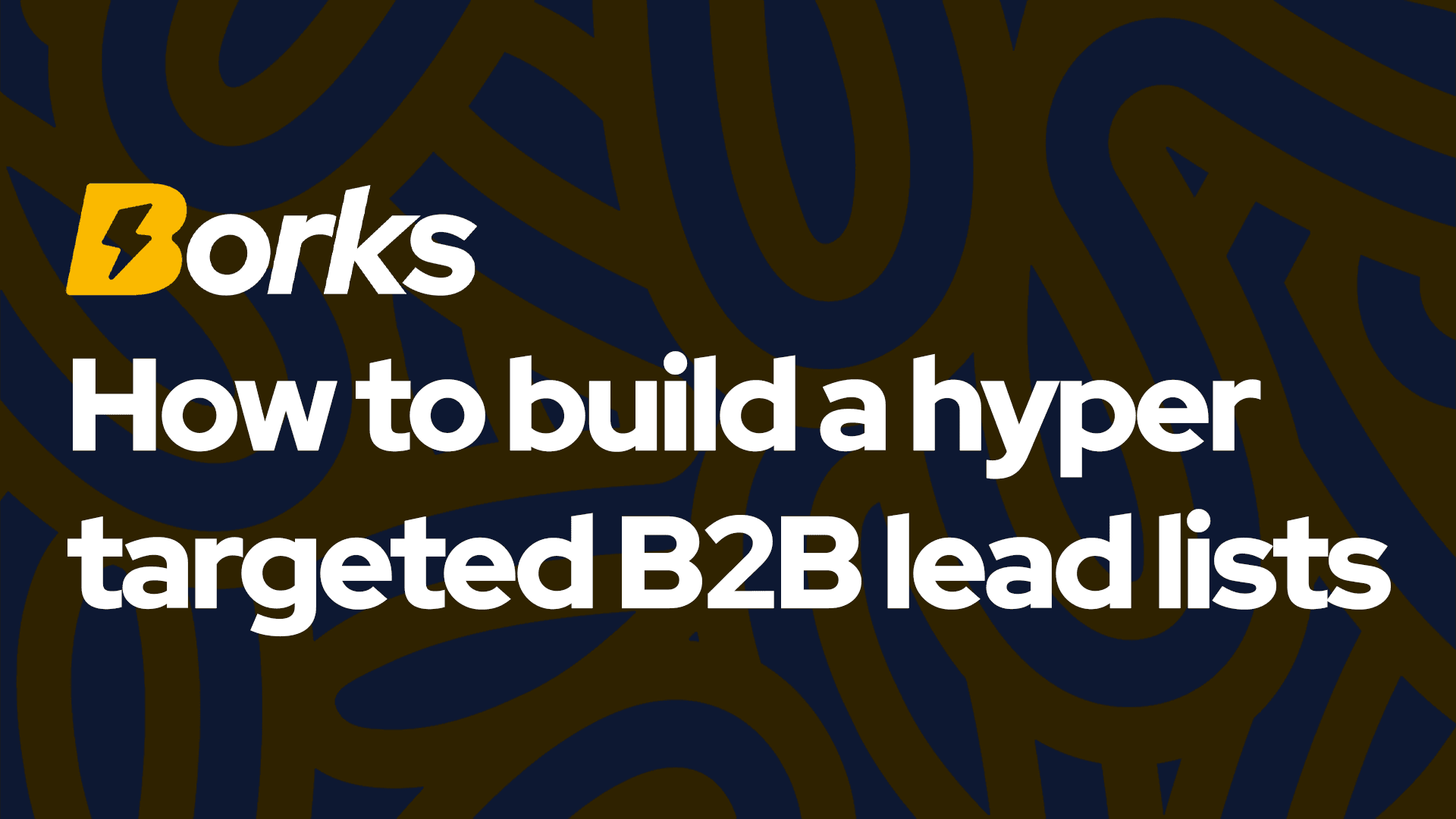Stop trying to book meetings with cold email in 2024
Stop trying to book meetings with cold email in 2024
Stop trying to book meetings with cold email in 2024
Explore Borks' game-changing guide to booking more calls without traditional cold emails. Learn our secret: commitment-aware selling, a strategy designed to build trust and tailor offers to your prospect's awareness levels. Perfect for any sector looking to upgrade their outreach and convert leads with ease. Dive in and transform your approach today!
Feb 8, 2024
Feb 8, 2024
3 minutes
3 minutes
#
Deliverability



Why You Should Rethink Cold Emailing for Booking Calls
In the realm of digital outreach, cold emailing has long been the go-to strategy for booking calls and engaging potential clients. Yet, as times change and markets evolve, there's a growing need to rethink this approach. Today, I'm unveiling a method that not only circumvents the drawbacks of traditional cold emailing but also significantly enhances your success rate in booking calls.
Understanding Awareness and Commitment
Before diving into the strategy, it's crucial to grasp two key concepts: awareness and commitment levels. These concepts dictate the effectiveness of your outreach efforts by measuring a prospect's awareness of their problem and their willingness to commit to a solution.
Awareness Levels:
Awareness levels categorize prospects based on their recognition of a problem, ranging from completely unaware to fully aware. The more aware a prospect is, the easier it is to engage them and propose a solution.
Commitment Levels:
Commitment levels evaluate the amount of effort a prospect is willing to invest to accept an offer. Low-commitment offers are easier for prospects to agree to, compared to high-commitment ones that require more trust and investment.
The Strategy: Commitment-Aware Selling
Leveraging these two concepts, we've developed a strategy that we refer to as "commitment-aware selling." This approach tailors your outreach to align with the prospect's awareness and commitment levels, ensuring your offers are both relevant and enticing.
Real-Life Application
Consider the difference in response you'd have if a best friend versus a stranger asked to borrow your car. Your willingness to comply ties directly to your awareness of the person's character and your level of commitment to helping them. This principle applies to cold outreach as well; understanding and addressing the specific context and needs of your prospects can dramatically improve your results.
The Better Solution for Cold Outreach
Instead of directly soliciting a call, which represents a higher commitment level, start by offering value with minimal commitment from the prospect. A personalized approach, such as sending a customized video highlighting a specific issue and offering a solution, can significantly increase trust and interest.
Example Strategy:
For an agency specializing in email marketing for e-commerce, instead of asking for a call in the first interaction, the initial outreach focuses on identifying a specific problem the prospect faces and offering a quick, personalized solution, like a custom video critique. This method accomplishes several things:
It establishes trust and authority by demonstrating expertise.
It lowers the barrier to engagement by offering free, actionable value.
It increases the prospect's awareness of their problem and your ability to solve it.
As a result, when you eventually suggest a more commitment-heavy action, like a free audit or a call, the prospect is more likely to agree. They're already familiar with you, trust your expertise, and are more open to exploring your services further.
Why This Works
This strategy transforms cold outreach from a numbers game into a targeted, trust-building exercise. By the time you propose a call, you're no longer a stranger making demands but a helpful expert offering to solve a problem. This not only increases the likelihood of booking calls but also improves the quality of these interactions, making it easier to close deals.
In summary, moving away from the traditional cold email approach and adopting a commitment-aware selling strategy can significantly enhance your outreach efforts. By focusing on building trust and offering value upfront, you're more likely to engage prospects meaningfully and convert them into clients.
Remember, the goal is to make your outreach as personalized and low-commitment as possible initially, gradually building up to the higher commitment ask. This approach not only respects your prospects' time and current awareness level but also sets the stage for a more productive and mutually beneficial relationship.
Why You Should Rethink Cold Emailing for Booking Calls
In the realm of digital outreach, cold emailing has long been the go-to strategy for booking calls and engaging potential clients. Yet, as times change and markets evolve, there's a growing need to rethink this approach. Today, I'm unveiling a method that not only circumvents the drawbacks of traditional cold emailing but also significantly enhances your success rate in booking calls.
Understanding Awareness and Commitment
Before diving into the strategy, it's crucial to grasp two key concepts: awareness and commitment levels. These concepts dictate the effectiveness of your outreach efforts by measuring a prospect's awareness of their problem and their willingness to commit to a solution.
Awareness Levels:
Awareness levels categorize prospects based on their recognition of a problem, ranging from completely unaware to fully aware. The more aware a prospect is, the easier it is to engage them and propose a solution.
Commitment Levels:
Commitment levels evaluate the amount of effort a prospect is willing to invest to accept an offer. Low-commitment offers are easier for prospects to agree to, compared to high-commitment ones that require more trust and investment.
The Strategy: Commitment-Aware Selling
Leveraging these two concepts, we've developed a strategy that we refer to as "commitment-aware selling." This approach tailors your outreach to align with the prospect's awareness and commitment levels, ensuring your offers are both relevant and enticing.
Real-Life Application
Consider the difference in response you'd have if a best friend versus a stranger asked to borrow your car. Your willingness to comply ties directly to your awareness of the person's character and your level of commitment to helping them. This principle applies to cold outreach as well; understanding and addressing the specific context and needs of your prospects can dramatically improve your results.
The Better Solution for Cold Outreach
Instead of directly soliciting a call, which represents a higher commitment level, start by offering value with minimal commitment from the prospect. A personalized approach, such as sending a customized video highlighting a specific issue and offering a solution, can significantly increase trust and interest.
Example Strategy:
For an agency specializing in email marketing for e-commerce, instead of asking for a call in the first interaction, the initial outreach focuses on identifying a specific problem the prospect faces and offering a quick, personalized solution, like a custom video critique. This method accomplishes several things:
It establishes trust and authority by demonstrating expertise.
It lowers the barrier to engagement by offering free, actionable value.
It increases the prospect's awareness of their problem and your ability to solve it.
As a result, when you eventually suggest a more commitment-heavy action, like a free audit or a call, the prospect is more likely to agree. They're already familiar with you, trust your expertise, and are more open to exploring your services further.
Why This Works
This strategy transforms cold outreach from a numbers game into a targeted, trust-building exercise. By the time you propose a call, you're no longer a stranger making demands but a helpful expert offering to solve a problem. This not only increases the likelihood of booking calls but also improves the quality of these interactions, making it easier to close deals.
In summary, moving away from the traditional cold email approach and adopting a commitment-aware selling strategy can significantly enhance your outreach efforts. By focusing on building trust and offering value upfront, you're more likely to engage prospects meaningfully and convert them into clients.
Remember, the goal is to make your outreach as personalized and low-commitment as possible initially, gradually building up to the higher commitment ask. This approach not only respects your prospects' time and current awareness level but also sets the stage for a more productive and mutually beneficial relationship.
Why You Should Rethink Cold Emailing for Booking Calls
In the realm of digital outreach, cold emailing has long been the go-to strategy for booking calls and engaging potential clients. Yet, as times change and markets evolve, there's a growing need to rethink this approach. Today, I'm unveiling a method that not only circumvents the drawbacks of traditional cold emailing but also significantly enhances your success rate in booking calls.
Understanding Awareness and Commitment
Before diving into the strategy, it's crucial to grasp two key concepts: awareness and commitment levels. These concepts dictate the effectiveness of your outreach efforts by measuring a prospect's awareness of their problem and their willingness to commit to a solution.
Awareness Levels:
Awareness levels categorize prospects based on their recognition of a problem, ranging from completely unaware to fully aware. The more aware a prospect is, the easier it is to engage them and propose a solution.
Commitment Levels:
Commitment levels evaluate the amount of effort a prospect is willing to invest to accept an offer. Low-commitment offers are easier for prospects to agree to, compared to high-commitment ones that require more trust and investment.
The Strategy: Commitment-Aware Selling
Leveraging these two concepts, we've developed a strategy that we refer to as "commitment-aware selling." This approach tailors your outreach to align with the prospect's awareness and commitment levels, ensuring your offers are both relevant and enticing.
Real-Life Application
Consider the difference in response you'd have if a best friend versus a stranger asked to borrow your car. Your willingness to comply ties directly to your awareness of the person's character and your level of commitment to helping them. This principle applies to cold outreach as well; understanding and addressing the specific context and needs of your prospects can dramatically improve your results.
The Better Solution for Cold Outreach
Instead of directly soliciting a call, which represents a higher commitment level, start by offering value with minimal commitment from the prospect. A personalized approach, such as sending a customized video highlighting a specific issue and offering a solution, can significantly increase trust and interest.
Example Strategy:
For an agency specializing in email marketing for e-commerce, instead of asking for a call in the first interaction, the initial outreach focuses on identifying a specific problem the prospect faces and offering a quick, personalized solution, like a custom video critique. This method accomplishes several things:
It establishes trust and authority by demonstrating expertise.
It lowers the barrier to engagement by offering free, actionable value.
It increases the prospect's awareness of their problem and your ability to solve it.
As a result, when you eventually suggest a more commitment-heavy action, like a free audit or a call, the prospect is more likely to agree. They're already familiar with you, trust your expertise, and are more open to exploring your services further.
Why This Works
This strategy transforms cold outreach from a numbers game into a targeted, trust-building exercise. By the time you propose a call, you're no longer a stranger making demands but a helpful expert offering to solve a problem. This not only increases the likelihood of booking calls but also improves the quality of these interactions, making it easier to close deals.
In summary, moving away from the traditional cold email approach and adopting a commitment-aware selling strategy can significantly enhance your outreach efforts. By focusing on building trust and offering value upfront, you're more likely to engage prospects meaningfully and convert them into clients.
Remember, the goal is to make your outreach as personalized and low-commitment as possible initially, gradually building up to the higher commitment ask. This approach not only respects your prospects' time and current awareness level but also sets the stage for a more productive and mutually beneficial relationship.
Table of contents
Recommended Topics
Share on Social Media

Schedule Free Meeting
with
George
, Co-founder
Are you still on the fence?
Are you still on the fence?
Lets schedule a free outbound audit. We're going to discuss your business, customer acquisition & bounce ideas about outreach. Worst case scenario you get 30 minutes of free advice. Best case scenario we get you tons of meetings booked into your calendar.
Lets schedule a free outbound audit. We're going to discuss your business, customer acquisition & bounce ideas about outreach. Worst case scenario you get 30 minutes of free advice. Best case scenario we get you tons of meetings booked into your calendar.
Get A Free Outbound Audit








